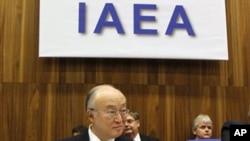The head of the United Nations International Atomic Energy Agency is traveling to Japan to learn more about the crisis at the country's Fukushima Daiichi nuclear plant. Fears are spreading throughout the region about the possible spread of radiation.
Before departing from agency headquarters in Vienna, Austria, Yukiya Amano, the director general of the IAEA, said he was traveling to Japan to get first-hand information about the situation at the Fukushima Daiichi nuclear plant.
"This is a very serious accident, but Japan is not alone. (The) International community is standing by Japan, we have a lot of offers of assistance to Japan, and I would like to convey this message to them," he said.
Amano is traveling with six nuclear experts, and said they would like to visit the plant. It was unclear whether Amano would personally visit the site.
Amano is a former high-ranking Japanese foreign ministry official. "Lots of countries, people are having worries, they have their nationals in Japan, they are worrying about the radioactivity levels, and we are getting information from Japan, but improved flow of information is highly appreciated," he said.
At airports across the region, radiation checks have been set up. Officials in Taiwan said Thursday 25 passengers, who arrived there from various cities in Japan, had been found to have "slightly higher" levels than normal.
At South Korea's Incheon airport in Seoul, Choo Dong-hui was among those returning home from Japan. Choo is studying in Fukuhsima, the prefecture where the plant is located. "My family was really worried and it seemed like the radiation level was continuing to rise, so I thought it would be better to be evacuated for now. So I came home temporarily," Choo said.
In Beijing and other cities across China, fears about radiation spreading caused many to empty shops of their stock of salt. Chinese consumers mistakenly believe that iodine contained in salt can protect against the effects of exposure to radiation.
Other rumors were that future batches of sea salt would be contaminated by radiation.
But most were simply buying salt to ensure they didn't run out while stocks were in such short supply.
"Actually, my family called me from our hometown and said they'd looked for salt like crazy and couldn't get any. I was so surprised, I said 'But isn't there loads of salt around?' and they said 'No, it's all related to the explosion in Japan, you should run and get some quickly.' I saw that our house had no salt, so I ran down to the supermarket, and people had already snatched it all up, there was none there either," said Beijing resident Zhang Fengxia.
The Chinese government says the country's residents are unlikely to be exposed to radiation from a nuclear plant in northeastern Japan.
Concerns about radiation have even spread as far away as the west coast of the United States, where demand for the drug potassium iodide has led to shortages at pharmacies.
Potassium iodide tablets are given to people exposed to excessive radiation to block absorption of radioactive iodine. The drug does not work, however, until after someone is exposed to radiation.
"There definitely is local concern about the radiation levels and fallout travelling here. We’ve been in contact with FEMA ((Federal Emergency Management Agency)) as well the CDC ((Center for Disease Control)). At this point in time, there does not appear to be a risk here on the West Coast," said Charlie Sardou, a spokesman for the American Red Cross in Los Angeles.
Catherine Chan says she doesn’t think there’s a radiation risk in California. "No, I don’t think so. From what I’ve heard on TV, I know it’s airborne, but Japan, I think they are doing a very good job to -- not to prevent it, but try to minimize the damage," she said.
U.S. officials say radiation levels at the plant are extremely high and have suggested a wider evacuation zone than Japan is implementing. Japan is calling for a 20 kilometer zone, while the U.S. has urged American citizens to avoid an 80 kilometer radius. U.S. officials also say that, at this time, radiation leaking from the crippled Japanese nuclear complex does not present a danger to the western United States or its Pacific territories.
MikeO'Sullivan in Los Angeles and Stephanie Ho in Beijing also contributed to this report









